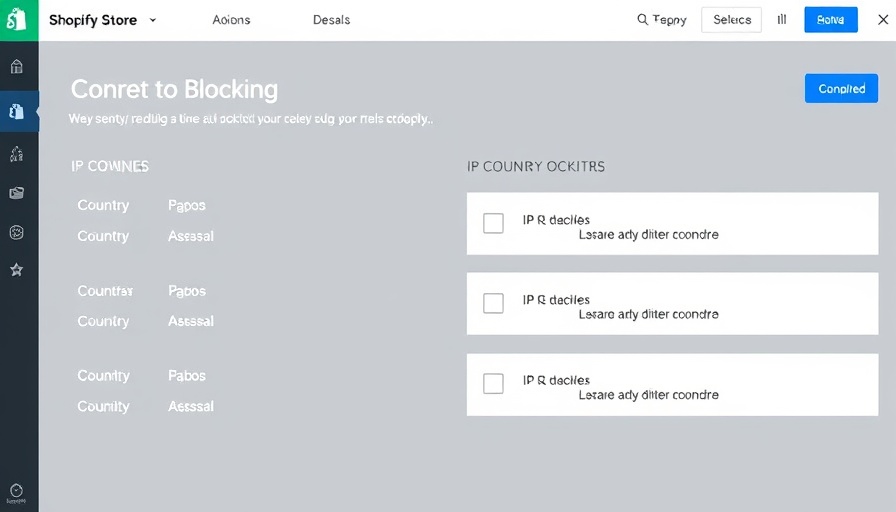
The Revolutionary Shift in Feed Management
Feed management is no longer a mere administrative chore confined to back-office IT teams; it has evolved into a cornerstone of growth within global commerce. As consumer expectations continuously rise and different digital platforms rapidly expand, businesses are realizing that effective feed management is essential for acquiring and retaining customers. This evolution reflects a shift towards stakeholders recognizing the strategic value that efficient product feeds can bring to their organizations.
Understanding Today's Consumer Behavior
In a world increasingly dominated by the digital presence, consumer behavior has changed dramatically. Gone are the days when consumers would tolerate outdated product information; they now seek real-time, high-quality updates that are consistent across every touchpoint. For instance, social commerce has grown significantly, with forecasts suggesting that 33% of consumers will shop through social media platforms by 2025. This dynamic creates new challenges for businesses as they must ensure that their product feeds are not just updated but also provide adequate information tailored for diverse marketplaces including giants like Amazon, Google, and emerging platforms.
The Role of AI in Modern Feed Management
Artificial intelligence has become a pivotal element in enhancing feed management. Businesses are leveraging AI-powered platforms to ensure that they can manage vast product catalogs seamlessly. Unlike traditional fixed product feeds that simply supported basic shopping ads, modern strategies focus on agility, allowing for unique product listings and tailored content based on current demand and specific regional regulations.
The Foundation of Agile, Integrated Feed Management Systems
These AI-driven platforms simplify complex processes like localization, compliance, and product optimization. Take the example of localization: organizations must adapt product descriptions, currencies, and inventory levels for specific markets. Compliance with field-specific requirements, such as GTINs or taxonomies, adds another layer to these challenges, making flexibility an absolute necessity.
A Case Study on Feed Efficiency
Consider Boozt Fashion, which stated, "If we didn’t have Productsup, we’d potentially miss out on 10% of traffic because we couldn’t efficiently optimize our data feeds." This highlights the crucial nature of sophisticated feed management in retaining market share. Organizations that invest in AI-powered feed management can ensure that their online presence stays competitive and engaging.
Preparing for Hybrid Commerce
As hybrid commerce becomes the norm, the interrelation between online and offline experiences will only deepen. For example, launching a physical store has been shown to potentially boost web traffic by 37% and online sales by 14%. This complication demands that companies manage their product content in a manner that is synchronized across all platforms. In response, centralized, automated systems are not just enhancements but necessities for companies aiming to thrive.
Sustainability Considerations in Feed Management
With the growing consumer demand for transparency regarding sustainability, feeds must now incorporate honest and traceable ESG (Environmental, Social, and Governance) information. Consumers increasingly favor brands that are open about their sustainability efforts. This means businesses must go beyond merely listing products; they must demonstrate authenticity and responsibility in their brand narratives.
Insights and Predictions for the Future
As we project into 2025, it is clear that businesses must reevaluate their feed management strategies not just from an operational standpoint but also as a key driver for revenue growth. The integration of automation and generative AI presents organizations with tools that enhance profitability while cutting down on inefficiencies. Without adopting these innovations, businesses risk falling behind in an increasingly competitive market.
With effective feed management strategies in place, organizations can not only meet but exceed consumer expectations. Tailored product content, optimized for varied platforms, will become a necessity rather than a luxury.
Take Action: Transform Your Feed Management Strategy
In conclusion, if you are a business owner looking to enhance growth and capture market share, investing in an agile, AI-driven feed management system is critical. The complexity of today’s omnichannel landscape requires proactive adjustments to how your product content is structured. Embrace these tools now to position your brand for success today and into the future.
 Add Row
Add Row  Add
Add 




Write A Comment